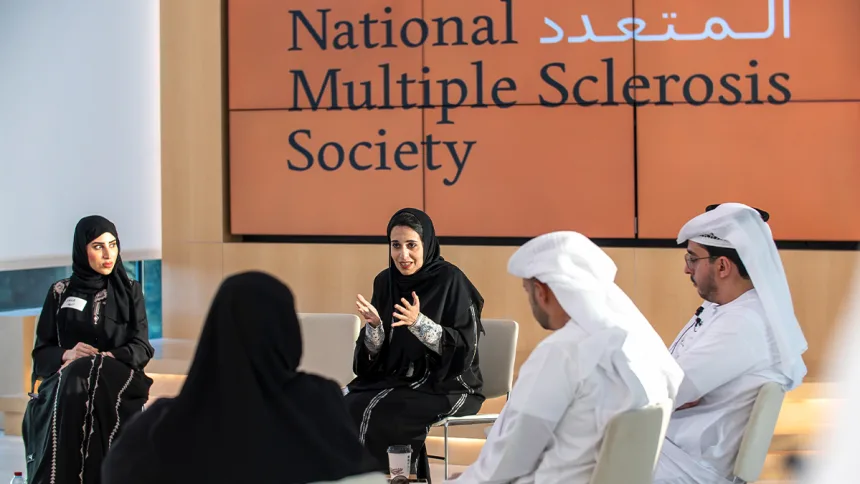Multiple sclerosis (MS) is a chronic autoimmune condition affecting the central nervous system that can significantly impact an individual’s quality of life. Recent studies indicate rising rates in the MENA region, with the UAE transitioning from a low to a moderately high-risk zone for MS. This reflects a global increase in MS prevalence and underscores the critical need to address gaps in care.
With MS normally affecting people at the height of their productive stage in life, with an average age of onset of around 26 in the UAE, it is imperative that we recognize the significant impact of this condition on individuals and society as a whole.
The UAE has long been a champion for inclusiveness and accessibility. This is evident in its progressive initiatives and policies that support people with chronic conditions. The introduction of the first-ever UAE MS treatment guidelines published by the UAE-based National MS Society (NMSS), is setting a new medical precedent for MS patients in the country.
These guidelines offer a comprehensive framework for managing, and treating MS, ensuring that patients receive timely and appropriate care.
People with MS (PwMS) often face challenges, including delays in diagnosis, lack of affordability of treatment, and access to comprehensive care, leaving many feeling unsupported and overwhelmed. While the recent publication of the MS Treatment guidelines poses a promising solution to overcome some of these challenges, their true impact relies on their effective implementation and adoption by stakeholders within the MS Ecosystem. The question is: how can stakeholders adopt these guidelines effectively to ensure that PwMS can receive the tailored care they need?
Access to comprehensive MS care
The UAE boasts a sophisticated healthcare system, with advanced treatments and multidisciplinary teams across the country. Its recent investments in precision medicine, telemedicine, and MS Centers of Excellence demonstrate innovative models for expanding healthcare access to ensure that all MS patients can benefit from the country’s advanced healthcare capabilities.
Also Read : National Multiple Sclerosis Society Introduces First MS Treatment Guidelines in the UAE
To enhance support for individuals living with MS, providing consistent access to MS specialists and addressing limitations within insurance schemes are crucial. Aligning health policies with evidence-based treatment recommendations can help MS patients overcome financial barriers that are standing in the way of life-changing therapies.
Why local MS guidelines matter
The UAE MS treatment guidelines mark a significant milestone in the efforts to standardize MS care. They emphasize equitable access to treatments and establish clear algorithms for treatment and disease management, reducing variability in care quality across healthcare settings. They represent a shift toward a more unified and evidence-based approach to MS care.
Key recommendations include prioritizing early treatment initiation and adopting an induction approach with high-efficacy therapies to decrease inflammatory activity early in the disease course. They provide a recommended pathway for breakthrough treatments for the eligible patient population. They also allow physicians to prescribe effective off-label therapies when licensed high-efficacy drugs are unavailable or unaffordable. It also provides detailed guidance for the treatment of pediatric, pregnant and lactating populations. Ultimately, the guidelines encourage shared decision-making in treatment plans between patients and clinicians, creating a more patient-centered approach to care.
“In line with the UAE’s Vision 2030, particularly its goals of achieving universal health coverage and developing innovation in care delivery, the guidelines provide a practical framework for realizing these ambitions for MS care by prioritizing precision medicine, advanced treatments, and equitable access to care.”
Yasmin Yasmin Mitwally, MPH, Manager Research and Advocacy, UAE NMSS
Assia Nait Kassi, Research Consultant – MentalEdGroup
The algorithms are user-friendly and written for a broader range of neurologists to provide care for people living with MS. This could improve access to care, particularly in areas where specialized MS care is less readily available.
By supporting healthcare providers with clear, actionable recommendations, the guidelines aim to improve patient outcomes in the UAE and beyond.
A public health priority
Effective MS management has the potential to drive transformative change in individual patients’ lives and the broader health system. Delayed diagnosis and inadequate treatment of MS often lead to severe disability, reducing patients’ ability to work and increasing their reliance on social support systems. Timely interventions and standardized care pathways can reduce the long-term socioeconomic burden of MS.
In line with the UAE’s Vision 2030, particularly its goals of achieving universal health coverage and developing innovation in care delivery, the guidelines provide a practical framework for realizing these ambitions for MS care by prioritizing precision medicine, advanced treatments, and equitable access to care.
The path forward
The NMSS UAE MS treatment guidelines represent a pivotal step in bridging research and clinical practice to transform the landscape of MS care.
By translating knowledge into actionable frameworks, these guidelines have the potential to drive significant advancements in treatment and long-term management. Their success lies in demonstrating how cutting-edge research and localized expertise can be leveraged to create impactful healthcare solutions.
This initiative underscores the importance of collaboration among researchers, healthcare providers, and policymakers to create a comprehensive roadmap for MS care. By working together, we can adopt a patient-centered approach that will revolutionize MS care, ensuring that people living with MS can continue to lead fulfilling lives, in turn paving the way for an equitable, healthy future for all.



















